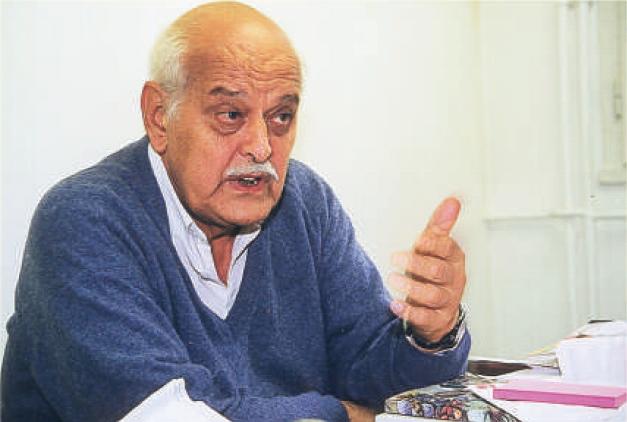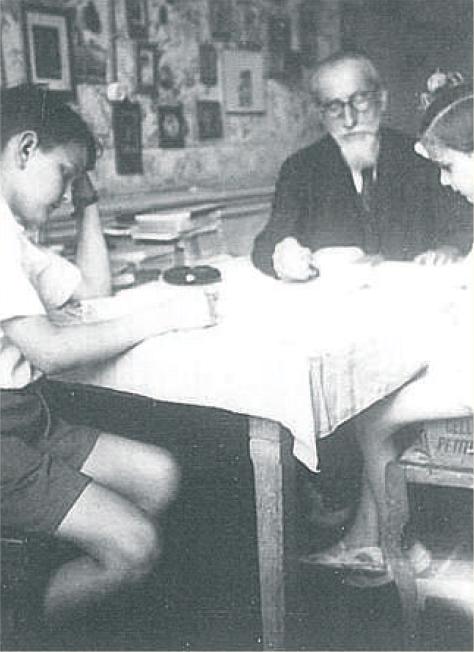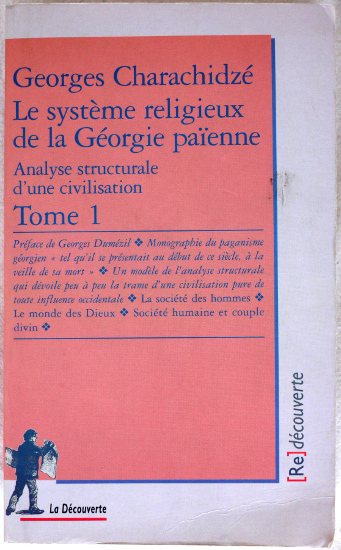Georges Charachidzé ✝
1930-2010

"Being the only person in my field, there is no merit in being the best."
When Georges Charachidzé died on 20 February 2010, much unique knowledge of the Caucasus, of its peoples and of their cultures and languages, died with him.
Charachidzé was born into the small community of Georgian exiles living in Neuville-sur-Orge, a southern suburb of Paris, in 1930. His father, a journalist and a member of Georgia's Menshevik parliament, had been sentenced to death by the Bolsheviks in 1922 following the end of the country's brief independence, and had — like many other Georgian intellectuals and aristocrats forced into exile by the Bolshevik takeover of their country— fled to Paris, where he had married a young French teacher.
Little Georges thus grew up speaking both Georgian and French. He attended the small French-Georgian school in Neuville, and was also tutored at home by an elderly Georgian intellectual, who taught him Georgian and Georgian literature.

His passion for all things Caucasian started early, but the turning-point came in 1953 when — aged only 23 — he sought out the supervision of the noted French historian and mythologist Georges Dumézil (1898-1986) for his doctoral thesis. This thesis would later become his first book — Le système religieux de la Géorgie païenne ("The religious system of pagan Georgia") — a unique, rigorous and complete analysis of traditional Georgian mountain paganism based upon Russian and Georgian studies of the phenomenon (notably the works of Bardavelidze, Makalatia, Ochiauri, Tedoradze, &c.) published by Maspero in Paris in 1968.

Charachidzé later described his first meeting with Dumézil:
'He was a very active man, very direct and forthright. He seemed somewhat taken aback by my intentions, and immediately answered: "Do you realize what you are undertaking! What could you possibly know of such things?" I told him that I knew Latin, Greek, Georgian and Russian, as well as German and English. He handed me a book in Georgian and told me to read, which I did. Then came a veritable interrogation. In the end, he seemed convinced, and accepted to supervise my thesis.'
In this way did Charachidzé become the only student to attend Dumézil's lectures on Ossetian religion.
In order to become an accomplished "caucasologist", Charachidzé travelled to Turkey (then and now a place of refuge for many Caucasian peoples who had fled their homeland following the Russian invasions of the XIXth century), where he began to learn many of the Caucasus' complicated languages. While in Turkey, he assisted Dumézil in his reconstruction of the moribund Ubykh language, famous for its plethora of consonants (around 80), which they succeeded in recording with the aid of its last "native" speaker, Tevfik Esenç.
Charachidzé also worked on the Avar language, publishing his Grammaire de la langue avar ("Grammar of the Avar language") in 1981. He also published many other books — notably Survivances mazdéennes chez les montagnards Géorgiens ("Mazdean remnants among the Georgian mountaineers", 1964), "Vieux-kabarde" et parler Besleney ("Old Kabardian" and Besleney-speech", 1965), Le symbolisme de l'arbre et de la vigne en Géorgie ("The symbolism of the tree and of the vine in Georgia", 1967), Introduction à l'étude de la féodalité géorgienne - Le code de Georges le Brillant ("Introduction to the study of Georgian feudalism - The code of George the Brilliant", 1971), Prométhée ou le Caucase: Essai de mythologie contrastive ("Prometheus or the Caucasus: Essay in contrastive mythology", 1986), Un Prométhée tcherkesse trop prométhéen ("A too Promethean Circassian Prometheus", 1986) La mémoire indo-européenne du Caucase ("The Indo-european memory of the Caucasus", 1987), La roue mortelle du Narte Soslan et les rituels caucasiens ("The deadly wheel of the Nart Soslan and the Caucasian rituals", 1987), and Derniers textes oubykhs de Haci Osman Köyü ("Last Ubykh texts of Haci Osman Köyü", 1988).
(Please go to this page on Google Books for a list of his publications.)
The obituary of Charachidzé published on the Circassian World website continues:
'Upon the deaths of K'alist'rat'e and Nino Salia, the founders and financiers of the long-running, Paris-based journal for Caucasian studies 'Bedi Kartlisa' (= 'Destiny of Kartli/Georgia'),
Charachidzé was the prime mover in organising, editing and publishing the successor journal 'Revue des Etudes Géorgiennes et Caucasiennes' (= 'Review of Georgian and Caucasian Studies'),
which, sadly, did not enjoy as long a run as its illustrious predecessor. In this outlet Charachidzé published a number of articles with Esenç offering further analyses of Ubykh after the
pattern of Dumézil's earlier articles. He also published there on Abkhaz. [...] It was well-known that Dumézil was not totally enamoured of Hans Vogt's 'gift' to him in 1963 of
his 'Dictionnaire de la langue oubykh' (= 'Dictionary of the Ubykh Language') and warned against its use without the sizeable list of emendations that Dumézil himself included in his 'Documents
Anatoliens III'. For years Charachidzé worked on a new Ubykh dictionary but never felt able to promise a date for its appearance. The work no doubt exists amongst his papers in manuscript-form,
and it is to be hoped that someone will step forward to see it through to publication to serve as the most fitting memorial for this devoted student of the Caucasus whose passing we all now
mourn.
May his good works live on, and may his soul eternally rest in perfect peace!'
In Memoriam, Georges Charachidzé ✝
1930-2010
Unless stated otherwise or obviously not the case, all the text and images on this website are © A.J.T. Bainbridge 2006-2010
Gmail: alexjtb
